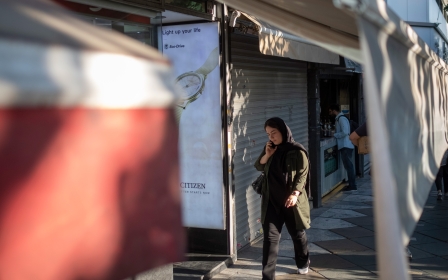US sanctions state-linked Iranian media ahead of Mahsa Amini's death anniversary

The US announced a fresh set of sanctions aimed at Iranian individuals and organisations they deem were involved in the severe crackdown on demonstrations that erupted in the country after the death of Mahsa Amini while in police detention last year.
"Mahsa’s tragic and senseless death in the custody of Iran’s so-called 'Morality Police' sparked demonstrations across Iran that were met with unspeakable violence, mass arrests, systemic internet disruptions and censorship by the Iranian regime," US Secretary of State Antony Blinken said in a statement released Friday on the US State Department's website.
Amini, 22, died while in the custody of the "morality police", who had arrested her on 16 September 2022 for supposedly not wearing her headscarf correctly. Officials argue she succumbed to prior health conditions, an assertion her family continues to challenge.
On Friday, the Treasury Department declared that it is identifying 29 individuals and organisations for designation, and includes three of the Islamic Revolutionary Guard Corps (IRGC)-linked media outlets - Fars News, Tasnim News and Press TV - along with 18 members from the IRGC and the Law Enforcement Forces.
This means that any international wire agency these media houses subscribe to would likely be unusable, as those wire agencies cannot accept payments from sanctioned entities.
Stay informed with MEE's newsletters
Sign up to get the latest alerts, insights and analysis, starting with Turkey Unpacked
According to the Treasury, Iran’s state-controlled media has “played a key role in the regime’s suppression of protests. Many of these organisations work in tandem with Iranian security and intelligence services, blurring the lines between government and media and extending the regime’s oppressive reach”.
Individuals linked to the Iranian government's "systematic censorship and blocking of access to the internet" and violations of human rights have also been sanctioned, the Treasury announced. This latest batch of sanctions marks the 13th set released by the Treasury Department's Office of Foreign Assets Control related to the demonstrations following Amini's death, as stated by the department.
Additionally, the State Department will enforce visa limitations on 13 Iranians thought to be associated with either detaining or causing the death of peaceful demonstrators or hindering their rights to free speech or gathering.
“As we approach one year since Mahsa Amini’s tragic and senseless death in the custody of Iran’s so-called ‘Morality Police,’ we recall that the movement of men and women across Iran, inclusive of different faiths and ethnic groups, was met with horrific violence, mass incarceration, and systemic internet disruption by the Iranian regime,” Under Secretary of the Treasury for Terrorism and Financial Intelligence Brian Nelson said.
“The United States, alongside the United Kingdom, Canada, Australia, and our other international allies and partners, will continue to take collective action against those who suppress Iranians’ exercise of their human rights.”
Earlier this week, Australia also announced that it would be targeting state-run media in Iran through sanctions in conjunction with the Mahsa Amini death anniversary.
Also earlier this week, the Biden administration announced that it waived sanctions on the transfer of $6bn in Iranian funds from South Korea to Qatar, which will pave the way for the eventual release of five US citizens held by Tehran.
As part of the deal, the administration agreed to release five Iranian citizens held in the US.
The waiver, signed by Blinken, now allows international banks to handle the Iranian funds without fear of sanctions.
Middle East Eye delivers independent and unrivalled coverage and analysis of the Middle East, North Africa and beyond. To learn more about republishing this content and the associated fees, please fill out this form. More about MEE can be found here.




